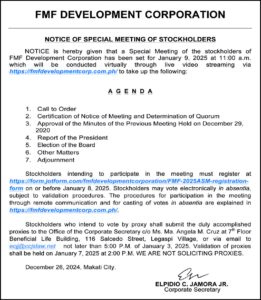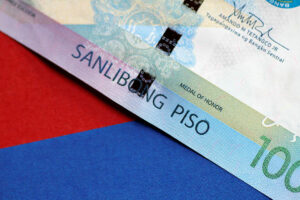By Luisa Maria Jacinta C. Jocson, Reporter
THE PHILIPPINES’ SCORE in a global anti-money laundering index worsened as its ranking declined to the 49th place out of 164 countries.
This, as President Ferdinand R. Marcos, Jr. on Wednesday cited the Philippines’ “progress toward exiting” the Financial Action Task Force’s (FATF) “gray list.”
“This is a very, very important item,” Mr. Marcos said in a speech at the 33rd regular meeting of the Anti-Terrorism Council, based on a transcript from his office.
“I know that it’s not spoken about a great deal in the public domain but nonetheless, as an obstacle to the continuing transformation of our economy, to the continuing transformation of our place in the world, this, us exiting from the gray list is a significant move,” he added.
The Philippines is targeting to exit by February the FATF’s gray list of jurisdictions under increased monitoring for “dirty money” risks. It has been on the gray list for over three years or since June 2021.
In the latest edition of the Basel Anti-Money Laundering (AML) Index published by the Basel Institute on Governance, the Philippines ranked 49th with an overall score of 5.84 (out of 10). It was worse than its previous rank of 53rd out of 152 jurisdictions, with an overall score of 5.64.
The index ranks a jurisdiction based on its risks of money laundering and terrorist financing and its capacity to counter them. It uses a 0-10 system, where a score of 10 indicates the highest risk level.
Myanmar topped the Basel AML index with a score of 8.17, followed by Haiti, Democratic Republic of the Congo, Chad and Venezuela.
The Philippines’ score was higher than the global average of 5.30.
“Issues of financial transparency are this region’s main weak spot, with more than half of jurisdictions having a high risk score in the Financial Secrecy Index,” the report said.
In the East Asia and the Pacific region, Myanmar had the highest score, followed by Lao PDR (6th), China (11th), Vietnam (15th), Cambodia (21st), Solomon Islands (35th) and Thailand (39th).
East Asia and the Pacific’s weakest area is financial transparency and standards, it added.
It cited low effectiveness scores for beneficial ownership transparency; the investigation, prosecution and sanctioning of money laundering offenses; and the prevention of proliferation of weapons of mass destruction.
“Almost half of the jurisdictions receive high risk scores for fraud and financial crimes,” it added.
Meanwhile, the countries that scored the lowest risk were San Marino (2.96), Iceland (3.00), Finland (3.07), Estonia (3.16) and Andorra (3.29).
Analysts said that the Philippines still has much to do to address in strengthening its money laundering/terrorist financing systems.
“It is indeed ironic that despite all the talk about the Philippines exiting the gray list, the world’s perception is that money laundering and the related issues in governance have worsened,” Filomeno S. Sta. Ana III, a coordinator of Action for Economic Reforms, said.
At its October plenary, the FATF kept the country in its list of jurisdictions under increased monitoring for dirty money risks.
However, the FATF said it initially determined that the Philippines has “substantially completed” the recommended action items to improve its anti-money laundering and counter financing of terrorism regime.
“Philippine officials and their apologists think that putting in place the technical standards would be enough for us to be taken off from the gray list. But what matters is the substantial compliance of rules,” Mr. Sta Ana said.
Chester B. Cabalza, founding president of Manila-based International Development and Security Cooperation said the country must “show consistency and transparency” in its goal of exiting the gray list.
“We have legal instruments to support and strengthen our institutions. The Philippines must stringently enforce it and prosecute violators to become more compliant,” he added.
Antonio A. Ligon, a law and business professor at De La Salle University in Manila, said: “The country needs to strictly enforce the anti-money laundering laws. Make sure to have strong monitoring measures.”
The FATF is set to conduct an onsite assessment in the Philippines to verify the progress of its action plan and implementation of reforms, which will likely take place early next year.
However, the Basel report also noted that exiting the gray list is just one step in a country’s anti-money laundering journey.
“Being delisted is naturally a cause for celebration and hope, but it’s not the end of the story. FATF standards continue to evolve and to strengthen, so jurisdictions need to constantly improve in order to keep up.”
“Avoiding or graduating from the gray list is one step along a never-ending journey to a resilient system that successfully wards of money laundering and related threats while not limiting financial inclusion and innovation,” it added.


















